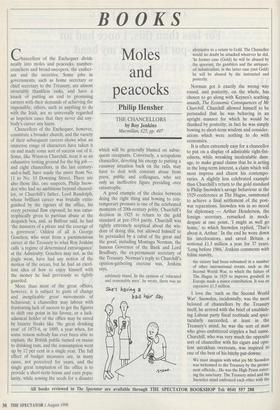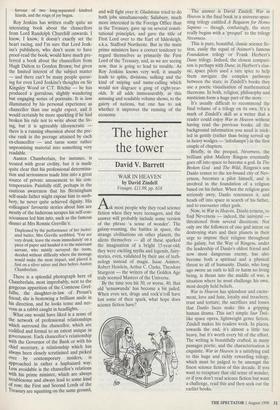BOOKS
Moles and peacocks
Philip Hensher
THE CHANCELLORS by Roy Jenkins Macmillan, £25, pp. 497 Chancellors of the Exchequer divide neatly into moles and peacocks, number- crunchers and broad-sweepers, the exuber- ant and the secretive. Some jobs in governments, such as home secretary or chief secretary to the Treasury, are almost invariably thankless tasks, and have a knack of putting an end to promising careers with their demands of achieving the impossible; others, such as anything to do with the Irish, are so universally regarded as hopeless cases that they never did any- body's career any harm.
Chancellors of the Exchequer, however, constitute a broader church, and the variety of their subsequent careers shows what an immense range of characters have taken it on and made some sort of success out of it. Some, like Winston Churchill, treat it as an exhaustive testing ground for the big job — and eight chancellors, in the last century- and-a-half, have made the move from No. 11 to No. 10 Downing Street. There are also those like, one suspects, Philip Snow- den who had no ambitions beyond chancel- lor, or Churchill's father, Lord Randolph, whose brilliant career was brutally extin- guished by the rigours of the office, his every personal flaw exposed; he was catas- trophically given to partisan abuse at the despatch box, and, as Balfour said, he had 'the manners of a pirate and the courage of a governess'. Oddest of all is George Goschen, who went from a parsimonious career at the Treasury to what Roy Jenkins calls 'a regime of determined extravagance' at the Admiralty; Goschen may not, as the jingle went, have had any notion of the motion of the ocean, but he had an excel- lent idea of how to enjoy himself with the money he had previously so tightly guarded.
More than most of the great offices, however, it is subject to gusts of change and inexplicable great movements of behaviour; a chancellor may labour with frustrating lack of success to get the figures to shift one point in his favour, or a lack- adaisical holder of the office may be saved by bizarre freaks like 'the great drinking year' of 1875-6, or 1889, a year when, for some reason nobody has ever been able to explain, the British public turned en masse to drinking rum, and the consumption went up by 12 per cent in a single year. The full effect of budget measures are, in many cases, not perceived for years, and the single great temptation of the office is to provide a short-term boom and earn popu- larity, while sowing the seeds for a disaster which will be generally blamed on subse- quent occupants. Conversely, a scrupulous chancellor, devoting his energy to putting a runaway situation back on the rails, may have to deal with constant abuse from press, public and colleagues, who see only an ineffective figure presiding over catastrophe.
A good example of the choice between doing the right thing and bowing to con- temporary pressure is one of the celebrated moments of 20th-century polity, Churchill's decision in 1925 to return to the gold standard at pre-1914 parity. Churchill was rightly extremely sceptical about the wis- dom of doing this, but allowed himself to be persuaded by a cabal of the great and the good, including Montagu Norman, the famous Governor of the Bank and Lord Bradbury, the ex-permanent secretary of the Treasury. Norman's reply to Churchill's opinion-gathering exercise was, Jenkins says,
sublimely bland. In the opinion of 'educated and reasonable men', he wrote, there was no alternative to a return to Gold. The Chancellor would no doubt be attacked whatever he did. 'In former case (Gold) he will be abused by the ignorant, the gamblers and the antiquat- ed industrialists; in the latter case (not Gold) he will be abused by the instructed and posterity.
Norman got it exactly the wrong way round, and posterity, on the whole, has chosen to go along with Keynes's scathing assault, The Economic Consequences of Mr Churchill. Churchill allowed himself to be persuaded that he was behaving in an upright manner for which he would be thanked by posterity; in fact he was simply bowing to short-term wisdom and consider- ations which were nothing to do with economics.
It is often extremely easy for a chancellor to put on a display of admirable tight-fist- edness, while wreaking incalculable dam- age, to make grand claims that he is acting in the long-term interest, a claim which will most impress and charm his contempo- raries. A slightly less celebrated example than Churchill's return to the gold standard is Philip Snowden's savage behaviour at the 1929 conference at The Hague, summoned to achieve a final settlement of the post- war reparations. Snowden was in no mood for diplomacy — Arthur Henderson, the foreign secretary, remarked in mock- despair at one point, 'I might as well go home,' to which Snowden replied, 'That's about it, Arthur.' In the end he wore down his interlocutors, and saved Britain a notional /1.5 million a year for 37 years. 'Long before 1966,' Jenkins comments with feline suavity,
the victory had been subsumed in a number of other international events, such as the Second World War, to which the failure of The Hague in 1929 to improve goodwill in Europe made a minor contribution. It was an expensive £1.5 million.
I love the 'such as the Second World War'. Snowden, incidentally, was the most beloved of chancellors by the Treasury itself; he arrived with the brief of establish- ing Labour party fiscal rectitude and spec- tacularly succeeded, at least in the Treasury's mind; he was the sort of man who gives embittered cripples a bad name. Churchill, who was very much the opposite sort of chancellor with his cigars and opu- lent astrakhan overcoats, was inspired to one of the best of his bitchy put-downs:
We must imagine with what joy Mr Snowden was welcomed to the Treasury by the perma- nent officials... He was the High Priest enter- ing the sanctuary. The Treasury mind and the Snowden mind embraced each other with the fervour of two long-separated kindred lizards, and the reign of joy began.
Roy Jenkins has written really quite an interesting book about the chancellors from Lord Randolph Churchill onwards. I know, I know, it doesn't exactly set the heart racing, and I'm sure that Lord Jenk- ins's publishers, who don't seem to have proof-read the book, would have much pre- ferred a book about the chancellors from Hugh Dalton to Gordon Brown; but given the limited interest of the subject matter — and there can't be many people queue- ing for even Lord Jenkins's thoughts on Sir Kingsley Wood or C.T. Ritchie — he has produced a garrulous, slightly wandering but engaging series of portraits. It is less illuminated by his personal experience as chancellor than one might expect, and it would certainly be more sparkling if he had broken his rule not to write about the liv- ing, but it is agreeably idiosyncratic — there is a running obsession about the pre- cise rank in the peerage attained by each ex-chancellor — and turns some rather unpromising material into something very readable.
Austen Chamberlain, for instance, is treated with great civility, but it is made quite clear that his professional determina- tion and seriousness made him into a great source of private amusement to his con- temporaries. Painfully stiff, perhaps in the cautious awareness that his Birmingham self-made father might expose him to snob- bery, he never quite achieved dignity. His colleagues' favourite stories about him are mostly of the ludicrous scrapes his self-con- sciousness led him into, such as the famous dinner at Mrs Ronnie Greville's:
Displeased by the performance of her inebri- ated butler, Mrs Greville scribbled, 'You are very drunk; leave the room immediately' on a piece of paper and handed it to the miscreant servant, who mistily surveyed the room, decided without difficulty where the message would make the most impact, and placed it first on a silver salver and then before Austen Chamberlain.
There is a splendid photograph here of Chamberlain, most improbably, next to the gorgeous apparition of the Comtesse Gref- fulhe, the daughter-in-law of Proust's friend; she is bestowing a brilliant smile in his direction, and he looks tense and ner- vous as a rabbit caught in headlights. What one would have liked is a sense of the network of professional relationships Which surround the chancellor, which are codified and formal to an extent unique in government. Each chancellor's relationship With the Governor of the Bank or with his chief secretary, a relationship which has always been closely scrutinised and picked over by contemporary insiders, is approached in rather a haphazard way. Less avoidable is the chancellor's relations With his prime minister, which are always troublesome and always lead to some kind of row; the First and Second Lords of the Treasury are squatting on the same ground, and will fight over it. Gladstone tried to do both jobs simultaneously; Salisbury, much more interested in the Foreign Office than in the Treasury, gave up on several consti- tutional principles, and gave the title of First Lord over to the Earl of Iddesleigh, a.k.a. Stafford Northcote. But in the main prime ministers have a correct tendency to regard themselves as primarily the First Lord of the Treasury, and, as we are seeing now, that is going to lead to trouble. As Roy Jenkins knows very well, it usually leads to splits, divisions, sulking and the kind of sniping and name-calling which would not disgrace a gang of eight-year- olds. It all adds immeasurably, as this amusing and readable volume shows, to the gaiety of nations, but one has to ask whether it improves the running of the economy.



























































 Previous page
Previous page